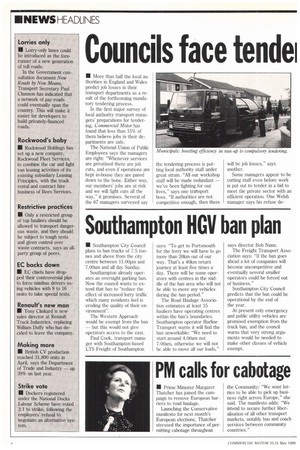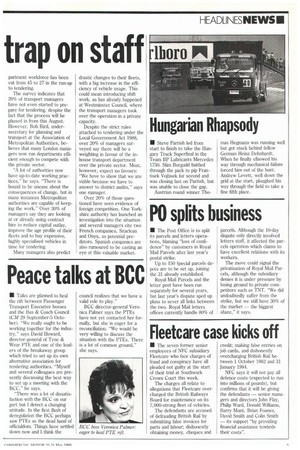Councils face tends trap on staff
Page 6

Page 7

If you've noticed an error in this article please click here to report it so we can fix it.
• More than half the local authorities in England and Wales predict job losses in their transport departments as a result of the forthcoming mandatory tendering process.
In the first major survey of local authority transport managers' preparations for tendering, Commercial Motor has found that less than 15% of them believe jobs in their departments are safe.
The National Union of Public Employees says the managers are right: "Whenever services are privatised there are job cuts, and even if operations are kept in-house they are pared down to the bone. Either way, our members' jobs are at risk and we will fight cuts all the way," it promises. Several of the 67 managers surveyed say the tendering process is putting local authority staff under great strain. "All our workshop staff will be made redundant — we've been fighting for our lives," says one transport boss. "If authorities are not competitive enough, then there will be job losses," says another.
Some managers appear to be cutting staff even before work is put out to tender in a bid to meet the private sector with an efficient operation. One Welsh manager says his refuse de partment workforce has been cut from 45 to 27 in the run-up to tendering.
The survey indicates that 20% of transport managers have not even started to prepare for tendering, despite the fact that the process will be phased in from this August. However, Bob Bird, undersecretary for planning and transport at the Association of Metropolitan Authorities, believes that many London managers now run departments efficient enough to compete with the private sector.
"A lot of authorities now have up-to-date working practices," he says. "There is bound to be unease about the consequences of change, but in many instances Metropolitan authorities are capable of keeping the work." Over 30% of managers say they are looking at or already using contract hire to reduce capital outlay, improve the age profile of their fleets and to buy expensive, highly specialised vehicles in time for tendering.
Many managers also predict drastic changes to their fleets, with a big increase in the efficiency of vehicle usage. This could mean introducing shift work, as has already happened at Westminster Council, where the transport managers took over the operation in a private capacity.
Despite the strict rules attached to tendering under the Local Government Act 1988, over 20% of managers surveyed say there will be a weighting in favour of the inhouse transport department over the private sector. Most, however, expect no favours: "We have to show that we are viable because we have to answer to district audits," says one manager.
Over 20% of those questioned have seen evidence of foreign competition. One Yorkshire authority has launched an investigation into the situation and several managers cite two French companies, Sitaclean and Onyx, as potential predators. Spanish companies are also rumoured to be casting an eye at this valuable market.












































































































